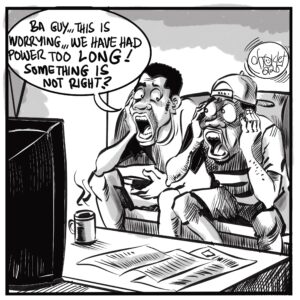FORMER Finance Minister Dr Situmbeko Musokotwane says the Statutory Instrument number 24 of 2021 under the Electricity Act of 2019 which was issued by government in April this year, is solely targeted at the Copperbelt Energy Corporation (CEC).
And Dr Musokotwane says the action being taken to target CEC will have negative effects on investor confidence.
In April this year, government issued Statutory Instrument No. 24 of 2021 under the Electricity Act of 2019 which they are calling ‘The Electricity (Common Carrier) (Declaration) Regulations, 2021.
The Statutory Instrument states that “In exercise of the powers contained in section 15 of the Electricity Act, 2019, the following Regulations are made: 1. These Regulations maybe cited as the Electricity (Common Carrier) (Declaration) Regulations, 2021. 2. The transmission and distribution lines set out in the Schedule are declared as a common carrier for the purposes of the Act. 3. The Electricity (Common Carrier) (Declaration) Regulations, 2020, are revoked.”
But in an interview, Dr Musokotwane said the statutory instrument was targeted at CEC because the transmission lines for CEC would become common carriers while only a few of Zescos’ infrastructure would be declared as common carriers.
“I think my concern really is that I am not sure whether this statutory instrument is there to encourage the industry. A common carrier for electricity is a declaration that a particular infrastructure, whether it is for electricity, whether it is an oil pipeline, whether it is a railway line, that means that anyone should have equal access. So, anyone producing electricity whether it is Zesco, whether it is that power station in Mamba, they must have equal access to those party stations. The question is in making the declaration, is the government making a declaration that all transmission lines whether they are for Zesco or whether they are for CEC or anybody else are they open to everyone? The answer from what I see is no! There are some belonging to CEC, and there are a few belonging to Zesco but not all the Zesco infrastructure has been declared a common carrier,” Dr Musokotwane said.
“So, to me that shows that the idea is basically to force CEC to open their transmission lines so that Zesco can use them but not the other way around. In other words, CEC or any other producer of electricity can not use all the Zesco lines to transmit power to where they want it to go. That tells us that CEC is being targeted. More especially when the fee of using that infrastructure is not freely negotiated between the owner and the user. How is it possible that the government can come to you and say ‘this infrastructure, people can be free to use it and the price they will pay for using it is this’. The owner has no voice to say ‘look this thing costs so much and to maintain it, it needs a minimum of this’.”
Dr Musokotwane accused government of trying to arm-twist CEC and that the implementation of the SI was a clever way of doing so.
“We should not blind ourselves to the history of where all this started from. This started through a dispute between the government and CEC where they arm twisted CEC. So, you can see that from the very beginning the intention of government is to arm twist CEC, and this is just a clever way of trying to appear to be following the rules, following the law. But in reality, it is the continuation of what started earlier on of arm-twisting CEC. So, the idea of opening transmission lines to everybody, that idea I support. Because it would mean that producers of electricity like Mamba, if the power lines were open they will not be required to sell power to maybe let me say Kantanshi Mines or First Quantum mines through Zesco. Because what happens now is that Mamba must sell to Zesco and then Zesco to First Quantum,” he said.
“So, the trouble there is that First Quantum will pay Zesco who are delivering electricity but Zesco fails to pay Mamba because of liquidity problems. So, if it was a common carrier Mamba would sell directly to First Quantum, get paid, avoid the problem of Zesco but of course pay transmission fees to Zesco. But in this particular case, it is not this idea that they are trying to implement. What is being implemented now is the targeted intervention against CEC.”
Dr Musokotwane said the action taken by government would reduce investor confidence.
“This sort of thing discourages investment because we need investment whether it is in power or whether it is all sorts of things. But when you target investors like this, you create a name that this is a country where investors are targeted. If you are considered not to be in good books with government for whatever reason, your business is going to suffer. For all those problems we are facing as a country, the solution is to get people to bring in money in the country, like investors. The only way you are going to solve this debt problem is to make the economy bigger. The economy can only earn more money if there is investment. The question is, with these kinds of measures, are we creating an environment to create the solution that we are looking for?” questioned Dr Musokotwane.
























